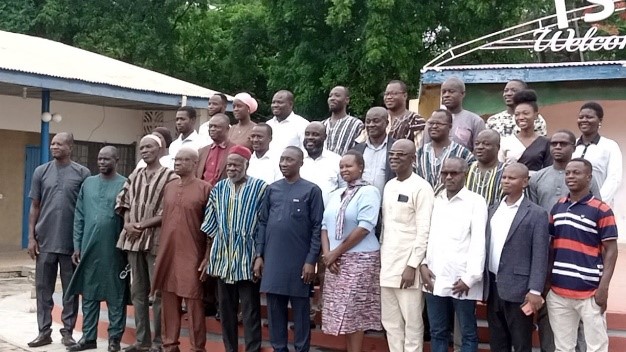A successful three-day workshop on “Organizational Capacity Needs Assessment, Awareness Creation & Collaboration on Land Rights, Land Administration and Land Management Practices in Ghana” was held at the In-Service Training Centre in Wa, Upper West Region, from Monday May 13, 2024 to Wednesday May 15, 2024. This initiative was a collaborative effort between Dr. Baslyd Begerr Nara of Simon Diedong Dombo University of Business and Integrated Development Studies (SDD-UBIDS) and Prof. Monica Lengoiboni of the University of Twente in the Netherlands.
Key stakeholders participated in the session, which was carefully planned to improve capacity building and create awareness of land rights under the Lands Act of 2020, Act 1036, as well as customary land rules and best practices. Among the attendees were representatives from the Department of Land Management at SDD-UBIDS, the Lands Commission, Indigenous Landowners, the Wa Central Customary Lands Secretariat, and settler farmers.
Under the distinguished patronage of Ag. Pro Vice-Chancellor, Professor Osumanu I. Kanton, the opening ceremony saw commendations for Dr. Nara and Prof. Lengoiboni for their visionary collaboration, emphasizing its potential to drive positive change in Ghana’s land administration landscape.
Highlighting the complexities of land management in Ghana, where both formal legal systems and customary laws coexist, the workshop aimed to address challenges faced by local landowners, particularly in urban areas. Issues such as indiscriminate land use and the encroachment by state officials on indigenous landowners’ territories, underscored the need for systemic change and community empowerment.
Recognizing Ghana’s democratic stability and commitment to international treaties as conducive to external collaboration and investment, the workshop laid the foundation for future partnerships and initiatives. By strengthening land tenure systems, facilitating land allocation, and promoting sustainable land management practices, the aim is to accelerate the country’s development trajectory while fostering social justice and environmental conservation.
The workshop’s agenda encompassed four thematic areas:
- Stakeholder Audit and Classification: An in-depth analysis of land administration stakeholders in Ghana, leveraging existing networks and stakeholder analysis tools to identify reliable partners for collaboration.
- Partnership Building and Needs Assessment: Engaging in exploratory missions with key stakeholders to assess existing land administration capacity and develop content for future workshops.
- Workshop Execution and Evaluation: Collaboratively designing and executing a skills development workshop in Wa, Ghana, involving local land administration experts and stakeholders. Feedback and insights gathered will inform future strategic engagements.
- Forward Planning and Next Steps: Developing a long-term collaboration pathway with local partners, focusing on activities such as land administration system design, tailored training courses, and continued participation in short courses.


